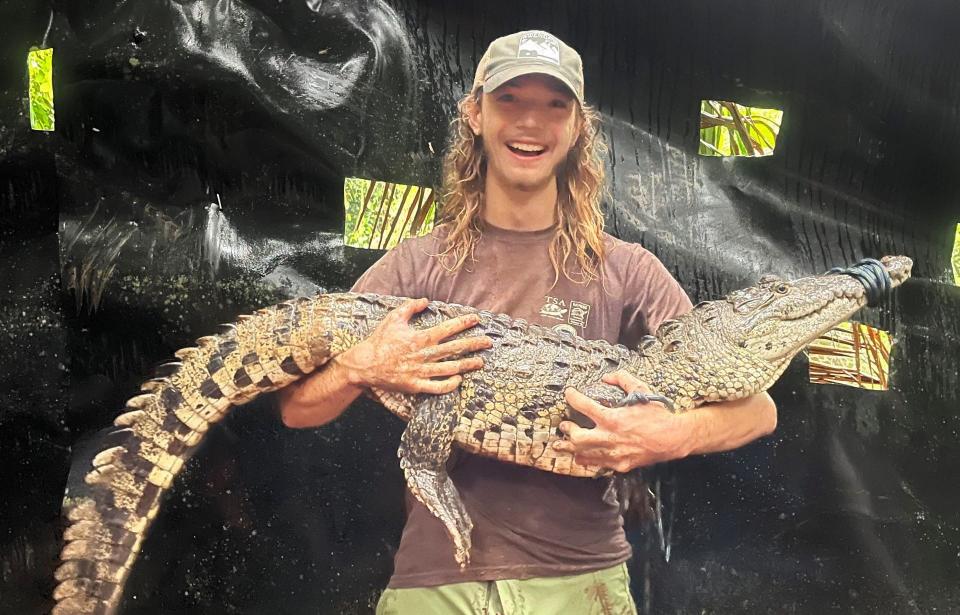Alligators prefer dogs to people | ECOVIEWS
Dogs, alligators and humans have a perverse connection.
A journalistic adage asserts that “dog bites man” is not a story, but “man bites dog” makes the front page. The opposite is true of alligators. “Person bites alligator” is not news because folks bite into alligators in restaurants every day. “Alligator bites person” makes headlines.
Indeed, of the slightly more than two dozen confirmed human deaths from American alligators during the past half century, all have made the news. Often a dog was involved.
More: Not all snakes bite, except when they do | ECOVIEWS
Someone recently asked me at a social event, “Did you hear about the lady at Hilton Head who was attacked and killed by a big alligator?” I had not heard of that incident. Instead, I asked my own question, “was she walking a dog?” Answer, “yes.”
Large alligators make a living eating waterfowl, turtles and snakes, as well as mammals encountered alongside wetlands. They will instinctively go after a deer, bobcat or dog walking along a shoreline — oblivious that the dog's leash is held in a person’s hand.

One scenario: the gator lunges for the dog, yanking the owner into the middle of the ensuing fracas, with everyone ending up in the water. Whether trying to save the dog or getting accidentally entangled in the leash, the person ends up confronting a predator intent on killing its prey.
The dog walker has inadvertently brought a four-legged prey animal into an alligator’s hunting zone, which includes many shorelines in Southern states. This is in no way to place blame on the person, who may have been completely unaware of the presence of alligators in an area and the predisposition of the big reptiles to go after mammals as meals.
Another common cause of perceived alligator attacks is a female alligator guarding a nest or her recently hatched babies. The nests are constructed on land just a few feet from the water, and the mother will often assist newly hatched babies to the water. The maternal instinct, especially from June to October, is powerful.
Protective mothers with gaping mouths and lots of teeth will hiss and charge out of the water at a suspected threat to their offspring. Some will challenge an adult human as readily as they will a fox or raccoon.
However, according to alligator expert Thomas Rainwater, research scientist at the Tom Yawkey Wildlife Center in South Carolina, no human fatalities have been documented from defensive attacks by mother alligators. Nonetheless, the prudent course of action is to stay away from alligator nests and baby alligators.
The native range of American alligators is the southeastern Coastal Plain, from coastal North Carolina along the Atlantic and Gulf coasts into Texas and up into Oklahoma and Arkansas. Alligators occur throughout Florida and Louisiana. Any body of water within their natural geographic range could potentially be home for an American alligator.
As with shark bites, how much lingering attention a fatal alligator attack gets depends on what else is happening in the news. A hurricane, an asinine statement by a politician or Taylor Swift’s position on ticket sale snafus can readily take top billing, keeping wild animal attacks below the fold and soon on the trailing edge of the never-ending “breaking news.”
A serious bite or fatality from an alligator or any other animal is devastating to the victim’s family. They deserve our sympathy. For future dog walkers, being aware of alligators in an area should be a foremost consideration. Large adult alligators can travel overland or along waterways and end up in a lake miles away from their point of origin.
Staying several feet away from the shore of any body of water that might serve as alligator habitat is advisable for anyone unfamiliar with the area. Scientists who study the ecology and behavior of alligators and other crocodilians worldwide have helped us understand the motivations for the rare attacks inflicted on humans. The next step is to effectively modify the behavior of humans who are around them.

Whit Gibbons is professor of zoology and senior biologist at the University of Georgia’s Savannah River Ecology Laboratory. If you have an environmental question or comment, email ecoviews@gmail.com.
This article originally appeared on The Tuscaloosa News: Alligators prefer dogs to people | ECOVIEWS

